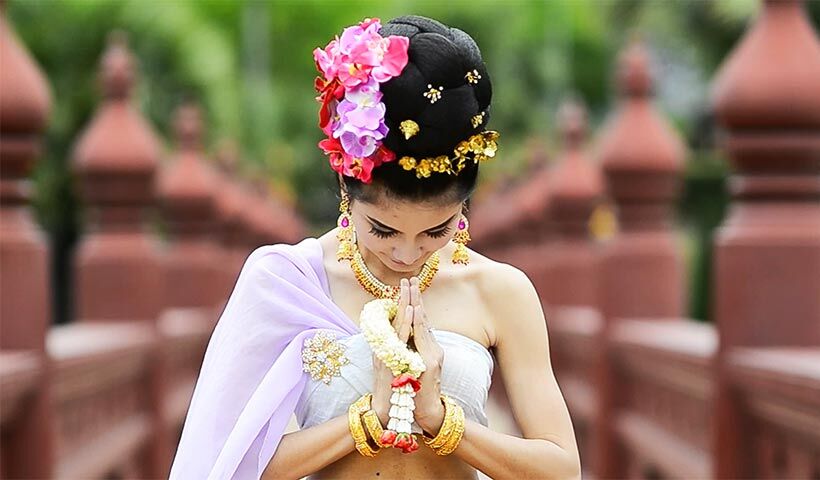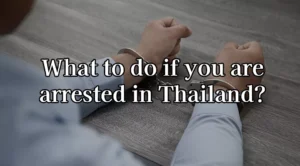Thailand is a country where culture and respect play important roles in daily interactions. Whether you’re visiting temples, sharing meals with locals, or simply exploring, understanding Thai customs will help you connect with the people and avoid unintended conflicts.
In this article, we will cover the essential dos and don’ts to help you make the most of your time in Thailand.
Dos in Thailand
When visiting Thailand, showing respect for local customs and practices will enrich your experience and allow you to connect with the culture on a deeper level. From gestures of politeness to temple etiquette, following these “dos” will help you navigate everyday interactions and make a positive impression on the locals.
- Show Respect for the Monarchy: In Thailand, the royal family is highly regarded, and disrespecting them can lead to severe consequences, including fines or imprisonment. If you’re in a public space when the national anthem plays, stop what you’re doing and stand silently until the anthem is finished. Photographs of the royal family are also common, and it’s important to steer clear of any form of criticism or humor related to the monarchy.
- Take Off Your Shoes: Removing your shoes is customary when entering temples, homes, and some businesses. You’ll often see a row of shoes outside the entrance as a cue to follow suit. If you’re visiting a friend’s home, it’s expected to take off your shoes unless explicitly told otherwise. In Thai culture, wearing shoes indoors is seen as unclean. Failing to remove your shoes can appear disrespectful and careless, particularly in homes or religious spaces.
- Dress Modestly, Especially in Temples: Modest clothing is required when visiting temples and other religious sites. Cover your shoulders, wear long pants or skirts, and avoid anything too tight or revealing. A light scarf or shawl can come in handy for unplanned temple visits. Dressing modestly shows respect for Thailand’s religious customs. Inappropriate attire such as sleeveless shirts, crop tops, or torn jeans may lead to being refused entry, as temples hold significant cultural and spiritual importance.
- Return the Wai Gesture: The “wai” is a traditional Thai greeting made by pressing your palms together with your fingers pointing vertically (similar to a “praying” pose) and offering a slight bow. If someone offers you a wai, return the gesture with similar respect. In Thai culture, seniority is highly valued and a person who is younger would normally initiate the “wai” a person who is older and the elder person would reciprocate the gesture by clasping their hands together without the bow. Ignoring or failing to return a wai is often seen as impolite. Since the wai is a core element of Thai etiquette, respecting it demonstrates an understanding and appreciation of local customs.
- Speak Calmly and Respectfully: Thais generally speak softly and value calm, respectful tones. Even when addressing frustrations or complaints, keeping a controlled tone shows maturity and respect for others. Speaking loudly or displaying anger can be uncomfortable for locals, as it’s often seen as a lack of self-control.
- Add Politeness Markers: Adding “krub” (for men) or “ka” (for women) to the end of sentences is a polite marker that softens speech and shows respect. Using these words when saying “thank you” or “hello” in Thai is a small gesture that locals appreciate. Politeness markers demonstrate an understanding of Thai etiquette and make your interactions smoother.
Don’ts in Thailand
Just as there are actions that are encouraged in Thailand, there are also behaviors to avoid. Thai culture has certain practices and gestures that can be seen as disrespectful. By steering clear of these “don’ts,” you’ll be able to show respect for Thailand’s customs and values and make the most out of your trip to the Kingdom.
- Don’t Point Your Feet at People or Sacred Objects: In Thailand, feet are considered the lowest and least clean part of the body, so avoid pointing them at anyone or any sacred object, like Buddha statues. Pointing your feet toward others, particularly in temples, can be seen as highly disrespectful. This simple oversight may result in uncomfortable situations or, at worst, offense.
- Don’t Touch People’s Heads: Avoid touching anyone’s head, even as a friendly gesture, including children. Thais view the head as the most sacred part of the body, and touching it is rarely appropriate. Casual head-touching can come across as intrusive or disrespectful.
- Don’t Put Your Feet Up: Avoid raising your feet on chairs, tables, or any elevated surfaces. This also includes refraining from showing the soles of your feet in public. Placing your feet in raised positions or pointing the soles at people can be seen as an act of disrespect.
- Limit Public Displays of Affection: Thailand is for the most part conservative regarding public displays of affection. While hand-holding is usually accepted, more intimate gestures such as kissing, may be frowned upon. Displays of affection may even attract negative attention.
- Avoid Displaying Anger in Public: Even when faced with frustrations, try to avoid raising your voice or showing anger in public. Losing your temper publicly is often viewed as a lack of self-control and may cause others to feel uncomfortable or embarrassed. A calm, respectful approach is always appreciated.
- Don’t Step Over People or Food: In Thailand, stepping over people or items like food is considered rude. Try to avoid stepping over anyone, especially in crowded places. Stepping over someone is seen as disrespectful and can cause offense, as it implies disregard.
- Don’t Touch or Sit on Buddha Statues: Avoid touching, climbing, or sitting on Buddha statues or sacred items. This applies both in temples and in public spaces where Buddha Images are often displayed. Disrespecting Buddha Images is offensive and can lead to confrontations or even legal repercussions. Showing respect toward these sacred objects is essential for a positive experience.
Experience Thai Culture with Siam Legal
If you’re excited to experience Thailand’s rich culture firsthand, Siam Legal’s Thai visa consulting services can help prepare you for your journey. Whether you are looking for a short-term or long-stay visa, contact Siam Legal to guide you through each step of the process. Our experienced Thai visa agents will ensure that you get your Thai visa swiftly and stress-free, so you can focus on enjoying all that Thailand has to offer.
Frequently Asked Questions About Thai Customs and Culture
Do you have to take off your shoes when entering a Thai home?
Yes, removing your shoes when entering a Thai home is expected and is seen as a sign of respect and cleanliness.
Is there a dress code for Thai temples?
Absolutely. Visitors to Thai temples, regardless of gender, should wear modest attire, covering shoulders and legs to show respect for these sacred spaces.
Are public displays of affection accepted in Thailand?
Generally, no, but it is best to limit physical affection in public in Thailand to avoid causing discomfort for those around you.
Is it okay to speak loudly in Thailand?
It’s best to keep your tone calm and respectful in Thailand, as loud voices can be interpreted as aggressive.
Can you get arrested for disrespecting the Thai Monarchy?
Yes, you can get arrested in Thailand for disrespecting the Thai monarchy and may face a sentence of 3 to 15 years in prison.
What is considered disrespectful in Thai culture?
In Thailand, certain actions are seen as disrespectful and may offend locals. For example, touching a person’s head is considered rude, as the head is regarded as the most sacred part of the body. Similarly, using feet to point at people or move objects is also offensive, as feet are viewed as the lowest part of the body.
Public displays of anger or confrontation are also discouraged since Thai culture values maintaining harmony and avoiding embarrassment. Ignoring or failing to return the wai — a respectful gesture of pressing palms together with a slight bow — can come across as dismissive, especially when greeting elders or those in authority. Finally, disrespecting Buddha images or temple grounds is deeply offensive, as these are treasured symbols in Thailand’s predominantly Buddhist society.
How do you greet someone in Thailand?
In Thailand, greetings are usually done with the wai, a traditional gesture of respect. To make the wai, place your palms together in a prayer-like position near your chest and slightly bow your head. Generally, people greet elders or those in positions of authority first, as a sign of respect. The wai is often accompanied by a friendly “Sawasdee,” which means “hello” in Thai.








































